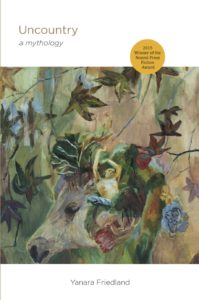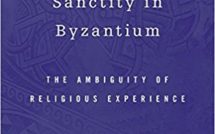

Yanara Friedland’s Uncountry: A Mythology, is a meeting place that is simultaneously tangible and unattainable. Figures from the Old Testament (such as Abraham, Isaac, Sarah, Hagar, and Ishmael) and events (such as Sarah’s relationship to Hagar, the binding of Isaac), characters from folk stories (such as Hansel and Gretel), ancestors of the author, strangers, and the author herself all migrate through time periods and geographies to come together in the pages of an uncountry, which is a country of archives breathing in a fog of memories and dreams.
The book is divided into four histories: “History of Ash,” “History of Breath,” “History of Hunger,” and “History of Future.” This naming is perhaps Friedland’s first gesture to push us toward the very displacement that is at the center of her narrative. These are not histories of the four natural elements—fire, water, earth, and air—or of certain individuals or families, or certain time periods that we might have expected. The world of this book has its own natural elements, its own histories, geographies, peoples, dreams, and memories. It has its own tradition, its own language.
Throughout the book, there is a constant move between the real and the mythical, the everyday and the poetic, the concrete and the imaginary. Mythology becomes of the everyday and the everyday turns into the material of mythological tales. For example, in the chapter “Exile” from “History of Ash,” we read, “They arrive from breath, the wind on a sunless day. / The ritual of silence, hunger, and disorientation creates wolf mothers. / But. They. Have. To. Be. Small. First,” which is immediately followed, in the next paragraph, by “bricklayers $7.00, lathers $6.00, plumbers $6.00, plumber’s helpers $2.50” a list that goes on for six more lines, ending with “unskilled labourers $2.00 to $2.50” followed, in the next paragraph by “Mimmy’s father, a Torah teacher in the East, becomes a peddler in the West” (14-15). In “Barren” in “History of Hunger” we read, “In the train to Las Vegas, Zina feels a sudden change of wind, as if the root at the base abandoned the tree” (117). Or this: “The moon was as ever. / The reality is that the butterfly is a small group that arose within the moths. The silk industry produces over 130 million kilograms of raw silk each year. / She could hear the moth razoring the air” (121).
In Friedland’s masterful poetics, dreams, myths, and memory become as important and valid as facts, statistics, and documents; while facts become as unreliable as narratives of the psychic world. Absences become as important as presences, white spaces as readable as written words, the unknown as illuminating as the known, pain and beauty inseparable requisites of one another.
Of her attention to memory Friedland writes, “Both the loss and recovery of memory is a structural device throughout the work. The writing, whether fictional or memoirist, is bound up with memory.”[i] Friedland is “specifically interested in the potential of cross-pollinating multiple sources of memory:” personal memory, family anecdotal narratives and memories, public documents. Her aim is to see “What narratives emerge from collective remembrance and witnessing, and how does the engagement of the diverse memory banks disrupt cohesive truth telling?”
Another theme of the book is migration—journeys through which the male and the female, I, we, and you, and many other seemingly opposite or separate entities join together and find new intimacies. Friedland worked with asylum seekers in Brussels and London in 2009, and it was because of that work that she began her inquiry into narratives of home and migration, the legal and official versus personal languages, used to recount their histories, and the tensions between the two. “This project sets out to trace ancient themes such as home, belonging, movement, and exile from early mythologies to Jewish diasporas, migrations on foot during World War II, as well as confronting more contemporary literary and philosophical reflections on space,” Friedland explains.
The narrative is fluid, perhaps to mirror the nature of migration, the movement and the instability; but also because this is how our memories and histories reach us, how future feels to us, fluid and ungraspable. They are a body of air surrounding us, an endless ocean washing over us. And there is nothing we can do but to let our bodies go into them. There is a lack of beginnings and endings. There are many points of arrival and departure. “Where to start when you do not know the story?” (37) There is uncertainty and doubt, and even though there are certain lucid points to reach out to and try to hold on to, they too, within the larger context, begin to lose their fixed identities, demanding to be reread, re-remembered, reconfigured.
Friedland is, moreover, playful with rhythm, moving all across the spectrum of sentence and narrative length, using repetitions (such as repetitions of “a woman” in “I. Lilith” (8) and “I. Sarah” (110) or “a man” in “I. Abraham” (45) and “II. Isaac” (85) or of the utterances in the dialogues on page 174), and choreographing white spaces as she does her words.
These formal choices are not there just for the sake of the aesthetics of the book; they mirror the nature of the issues Friedland addresses. They are there to embody the kind of reading and interpreting the book wants us to have of our worlds and their histories. Nothing and no one is fixed. We need to keep walking and we need to constantly renew our trust in the openness of the narrative landscape.
Uncountry: A Mythology demands of us the kind of journey into time and space that cannot be planned, but rather needs to be experienced and revealed, requiring a trust of the unknown. However, throughout the narrative, it provides us with maps and keys that could guide us in accessing this unfamiliar yet familiar territory. In the epigraph, Friedland channels the voice of Ana Mendeita to tell us: “… There is no original past to redeem: there is the void, the orphanhood, the unbaptized earth of the beginning, the time that from within the earth looks upon us. There is above all the search for the origin.” Or in the body of the narrative Friedland informs us that “The German [the author’s father tongue] word for “wound” is spelled similarly to the German word for “miracle” (93). Or “And their bodies start to resemble a message” (187). Perhaps each reader can pick and choose the guiding signs that speak most intimately to her/him. But what is most important is that even with the maps and keys, going into Uncountry demands of us courage not unlike the one we need to face life in its multiplicity and forever unpredictability.
Reviewed by Poupeh Missaghi
Poupeh Missaghi is a writer, Persian < > English translator, and Iran’s Editor-at-Large for Asymptote. A Ph.D. graduate from University of Denver’s Creative Writing Program, she has published work in Entropy, The Brooklyn Rail, Feminist Wire, World Literature Today, Guernica, Quarterly Conversation, Asymptote, and elsewhere. She lives in New York.
Uncountry: A Mythology
By Yanara Friedland
Publisher: Noemi Press
Paperback / 220 pages / 2016
ISBN: 13 9781934819616
References:
[i] The quotes from the author are from her unpublished critical notes to the book, which she kindly shared with me for this review.
To read more book reviews, please click here.
Published on April 4, 2017.




